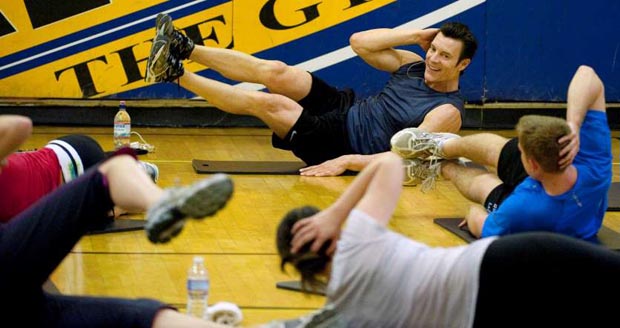How to Stay Motivated and Become an Exercise Addict

We all have friends who, despite hectic schedules, never miss a day at the gym. Who can’t stop talking about the next 10K. Who can’t stop smiling after yoga class. Sure, they’re a little, well, obsessive about working out. But we envy them! The good news is we all have the potential to become fitness-obsessed, says Tom Holland, a Connecticut-based celebrity fitness trainer, exercise physiologist, and expert in sports psychology. Here are 20 proven ways to make exercise a habit.
[contentblock id=1 img=adsense.png]
GET UP EARLIE
Right this minute, go set your alarm and lay out everything you need for your morning workout. (Switch on a lamp as soon as your alarm goes off, says fitness blogger Tina Haupert, so you wake up faster.) Working out at the same time every day may help you improve more quickly, a study from the University of North Texas found, and other research has shown that people who exercise in the morning are more likely to stick with their workout than those who exercise later in the day. After all, if you get your sweat session out of the way first thing in the a.m., you won’t miss out if unexpected distractions come up later in the day. (And while we’re on the subject, skip the snooze button: Research suggests that those extra few minutes in bed may actually make you more tired.)
[contentblock id=2 img=adsense.png]

FIND YOUR NICHE
So you tried spinning and you hated it, or you hurt yourself on your first day of CrossFit. That doesn’t mean that all forms of fitness aren’t for you so get back out there and try a different one. “Find something that makes you tune out and gives you a release from your daily grind,” says Wollwhether that means focusing on the ground ahead of you on a trail run, or following the instructor in a Zumba class. “You’ll know you found it when you look at the clock and an hour flashes by without you noticing.” Holland agrees: “I always tell my clients, ‘I don’t exercise,'” he says. “I’ll go for a run or go to the gym, but I don’t think of it as exercise because that suddenly gives it a negative connotation.”
JOIN A CLUB
Working out is more fun with friends and it’s a lot harder to bail on when you’ve got other people relying on you. “I think that’s why groups like CrossFit and Weight Watchers are so successful,” says Holland. “It shows the value of the support system, which should be an integral part of any workout plan.” Your exercise club could be an entire gym full of people, a regular fitness class where everyone knows your name, or just one exercise buddy who makes sure you’re out of bed to meet her for your morning walks. Feeling ambitious? Start a fitness or weight-loss contest with your friends or coworkers, suggests Woll. “A little healthy competition always gets you motivated!”
[contentblock id=3 img=gcb.png]

BECOME A GROUPIE
The right teacher can make a fitness class feel more like a party than a workout, whether it’s Zumba, spinning or cardio kickboxing. “Finding an instructor is like dating,” says Woll. “If the first one doesn’t work, keep looking. This person should make you want to come to the gym!” (Just be ready for some competition: Popular fitness instructors see their classes fill up fast, and maintain loyal followings even when they switch class times and locations.) You can even glean workout inspiration from celebrity instructors and trainers. Even if you’ve never met them in person, following your fitness idols on Facebook, working out to their DVDs or reading their advice in magazines can all be powerful motivators to follow their examples.
COUNT YOUR CALORIES
It’s not directly related to exercise, but paying closer attention to what you’re putting into your body can make you more aware of how you’re treating it, overall. (Keeping a food and fitness diary or using a calorie-tracking app can also remind you of how a few more minutes on the elliptical can help balance out that extra scoop of guacamole.) Plus, a 2013 Stanford University study found that people who adopt a diet and exercise program together are more likely to stick with both new habits than those who tackle an individual goal by itself.






